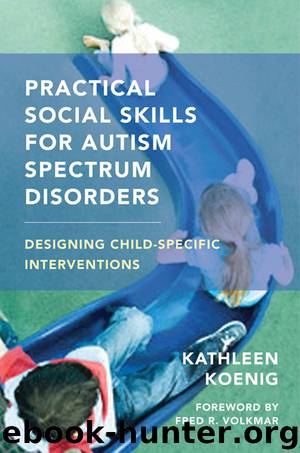Practical Social Skills for Autism Spectrum Disorders by Kathleen Koenig

Author:Kathleen Koenig
Language: eng
Format: epub
Publisher: W. W. Norton & Company
Published: 2012-02-09T05:00:00+00:00
Figure 5-2. Initial plan for group intervention.
For the purposes of this example, however, the group leaders proceed to outline some strategies to begin the intervention process (Figure 5-2). These strategies will change over time as the group members get to know each other, and the leaders learn more about why the children behave as they do. In this particular group intervention, based on Koenig et al.’s (2010) model, the challenges each child faces are made public within the group in a sensitive and gentle way over time, and children are encouraged to help each other learn new strategies and replacement behavior.
Additionally, each peer tutor is given a single instruction prior to the group, and the group leader makes sure to reinforce the tutor when the tutor intervenes. For example, in this group, a peer tutor might be instructed to “sit near Ari, greet him, and redirect him if he seems to not be attending; occasionally make a comment to him.” This might be the single instruction for this tutor for several weeks, until Ari gets comfortable and begins to respond. If he does not respond or actively resists, the group leaders will need to create a new strategy for helping Ari with this challenge. The objective here is to help Ari get comfortable with the new behavior of staying engaged with the group. Prompting and reinforcement can be used, of course, but there should be ongoing observation of his behavior to determine why it changes when it does, and what is reasonable to expect.
For each child in the group, the leaders develop simple strategies to address each objective and then develop more sophisticated strategies as time goes on. Of course, strategies change when they don’t work! Planning for each group involves a fun and possibly silly activity, in which children are coached to practice their target skills, in the context of a game. Members are complimented on their strengths and encouraged to help their friends work on their objectives. As an example, to help Leo reduce remarks unrelated to the topic at hand, a system is set up so that if he makes an appropriate remark, he gets a blue poker chip, and if he says something off topic, he gets a red one. The chips are placed in a clear plastic jar so everyone can see how things are going. If Leo has more blues than reds at the end of the session, everyone in the group gets a reward (a Tootsie Roll, a popsicle, or whatever the kids might want to work for). The group leaders encourage everyone to help Leo, making it a fun activity, and Leo starts to work for the group’s approval and reward. In our groups at Yale, we found that even the most socially disinterested child could be engaged in this kind of game.
The leaders should be documenting the progress of each child on objectives, using a simple tally of behaviors for each group if that works, and graphing a child’s progress over time.
Download
This site does not store any files on its server. We only index and link to content provided by other sites. Please contact the content providers to delete copyright contents if any and email us, we'll remove relevant links or contents immediately.
I Capture the Castle by Dodie Smith(2038)
The Heavy by Dara-Lynn Weiss(1810)
Aspergirls by Rudy Simone(1698)
Be Different by John Elder Robison(1650)
Autism's False Prophets by Paul A. Offit(1537)
My Child's Different by Elaine Halligan(1516)
Smart but Scattered—and Stalled by Richard Guare(1501)
101 Tips for the Parents of Boys with Autism by Ken Siri(1495)
Asperger Syndrome (Autism Spectrum Disorder) and Long-Term Relationships by Ashley Stanford(1426)
What's Making Our Children Sick? by Michelle Perro(1416)
ADHD by Mark Selikowitz(1394)
Girlish by Lara Lillibridge(1388)
On Immunity: An Inoculation by Biss Eula(1362)
An Adult with an Autism Diagnosis by Gillan Drew(1355)
Nerdy, Shy, and Socially Inappropriate by Cynthia Kim(1350)
Animal-assisted Interventions for Individuals with Autism by Temple Grandin(1332)
The Cities by K.A Knight(1317)
Sarah's Child (Hqn Romance) by Linda Howard(1313)
Seeing Ezra by Kerry Cohen(1307)
